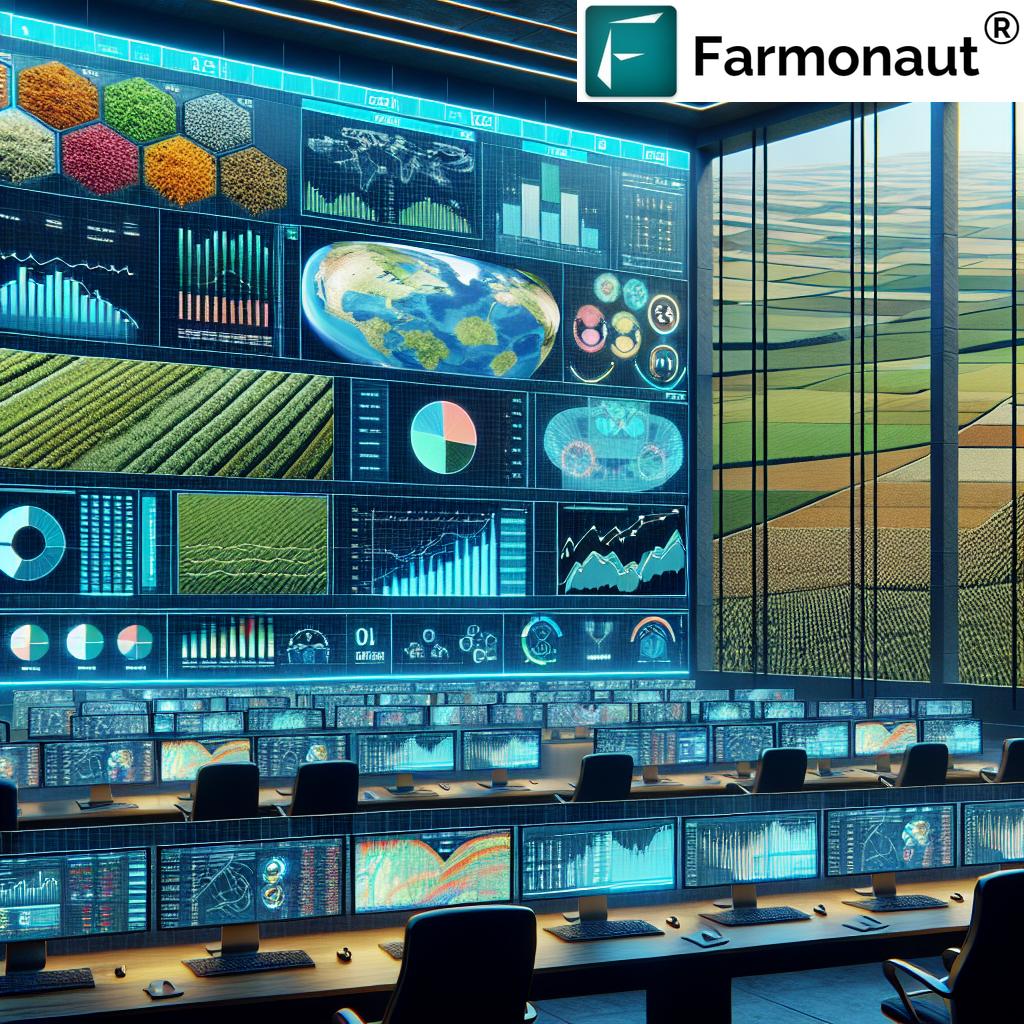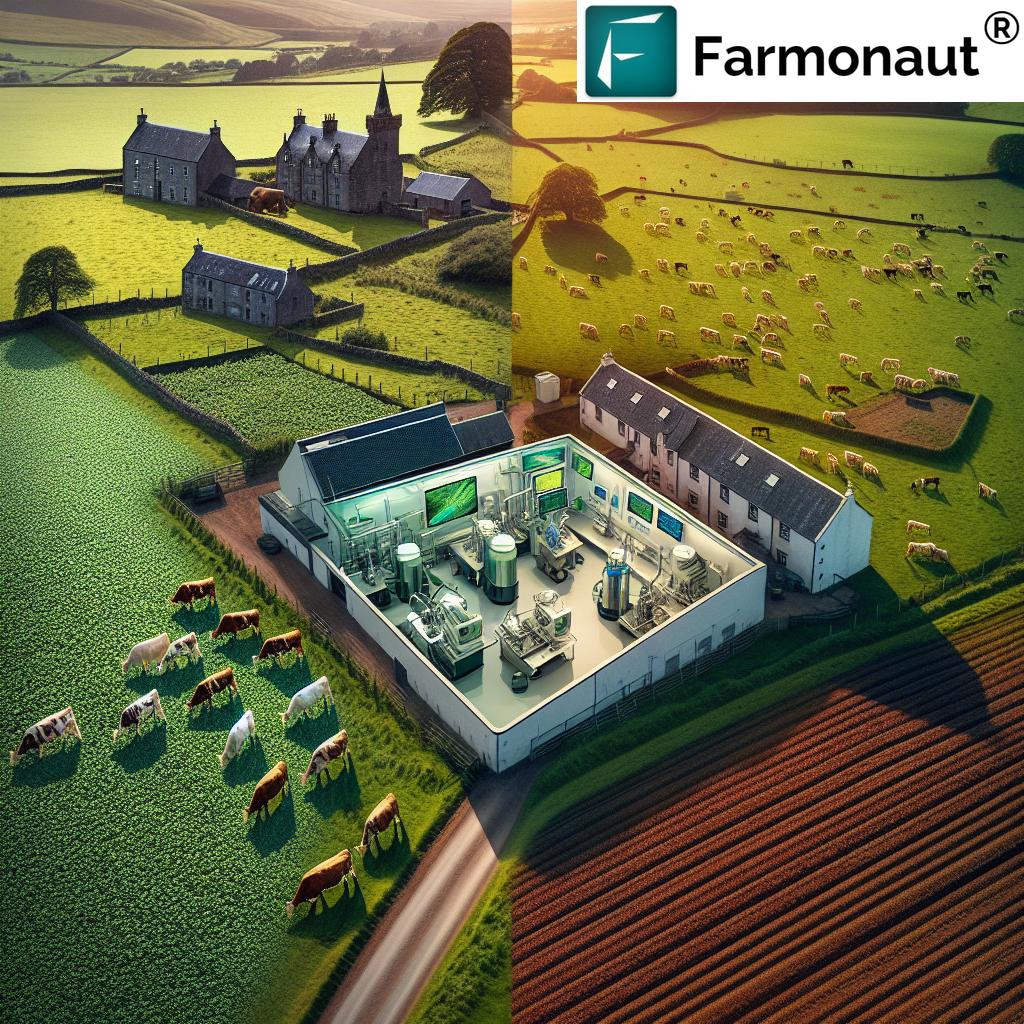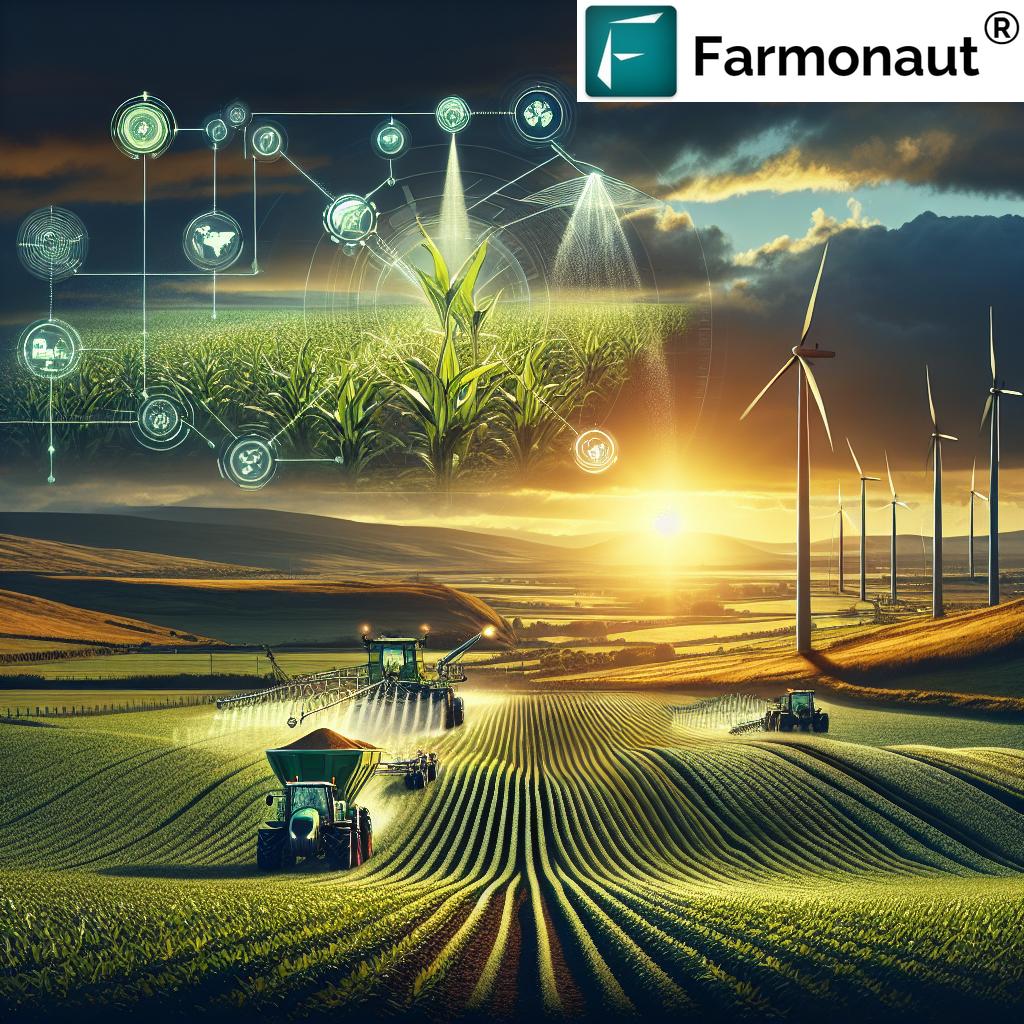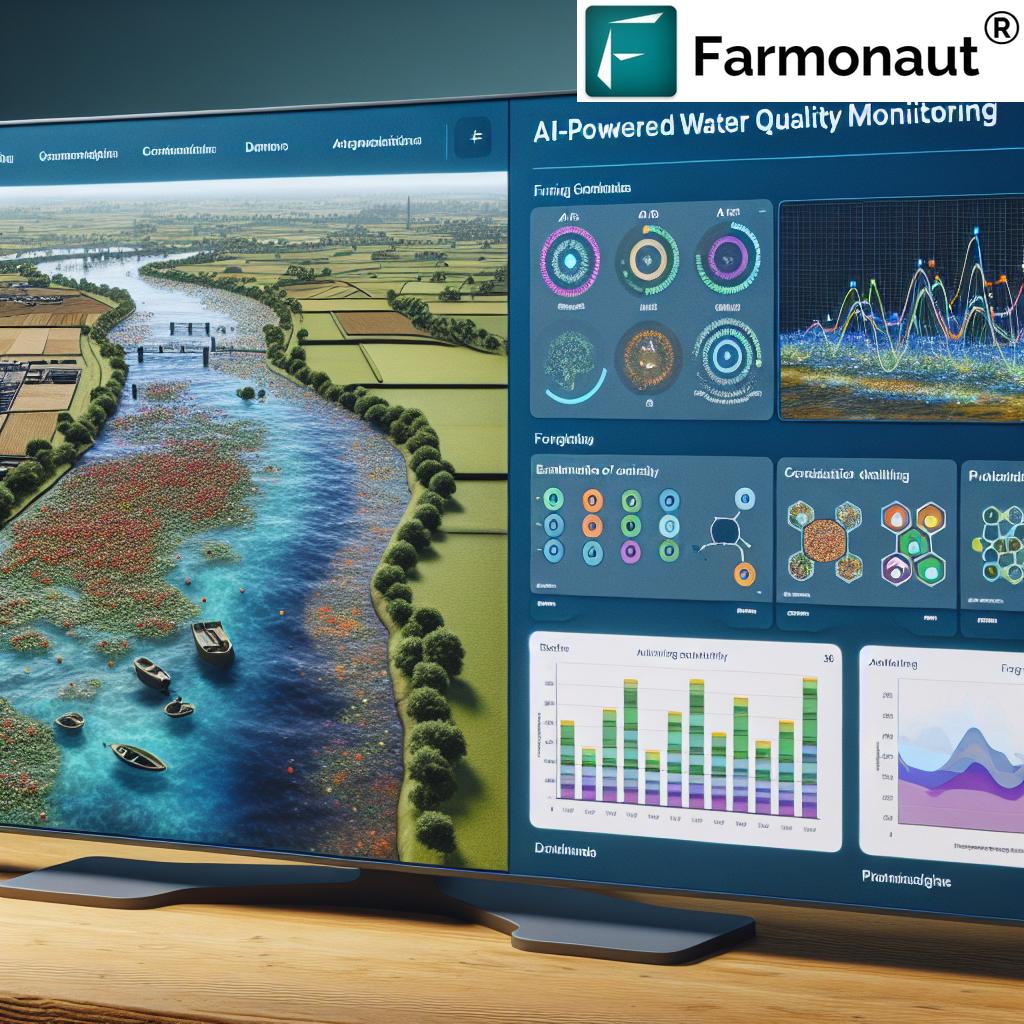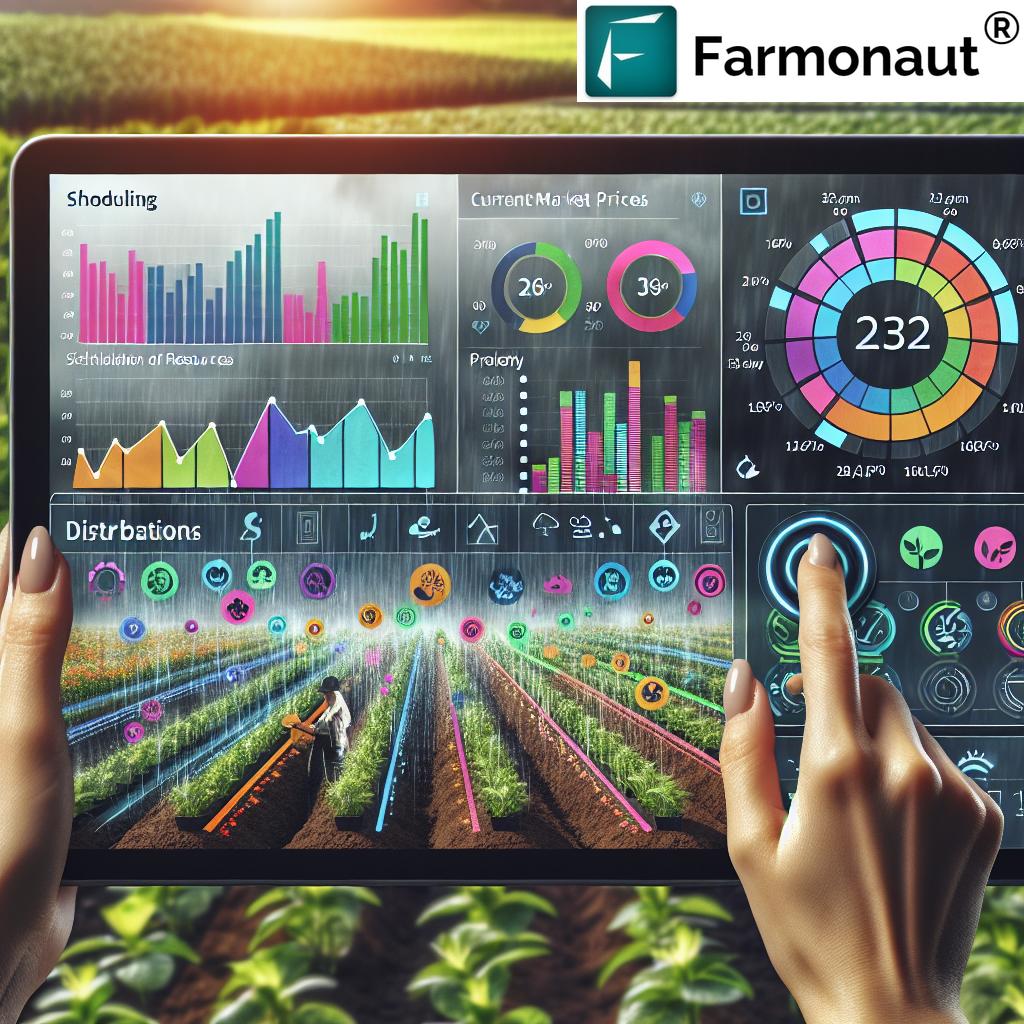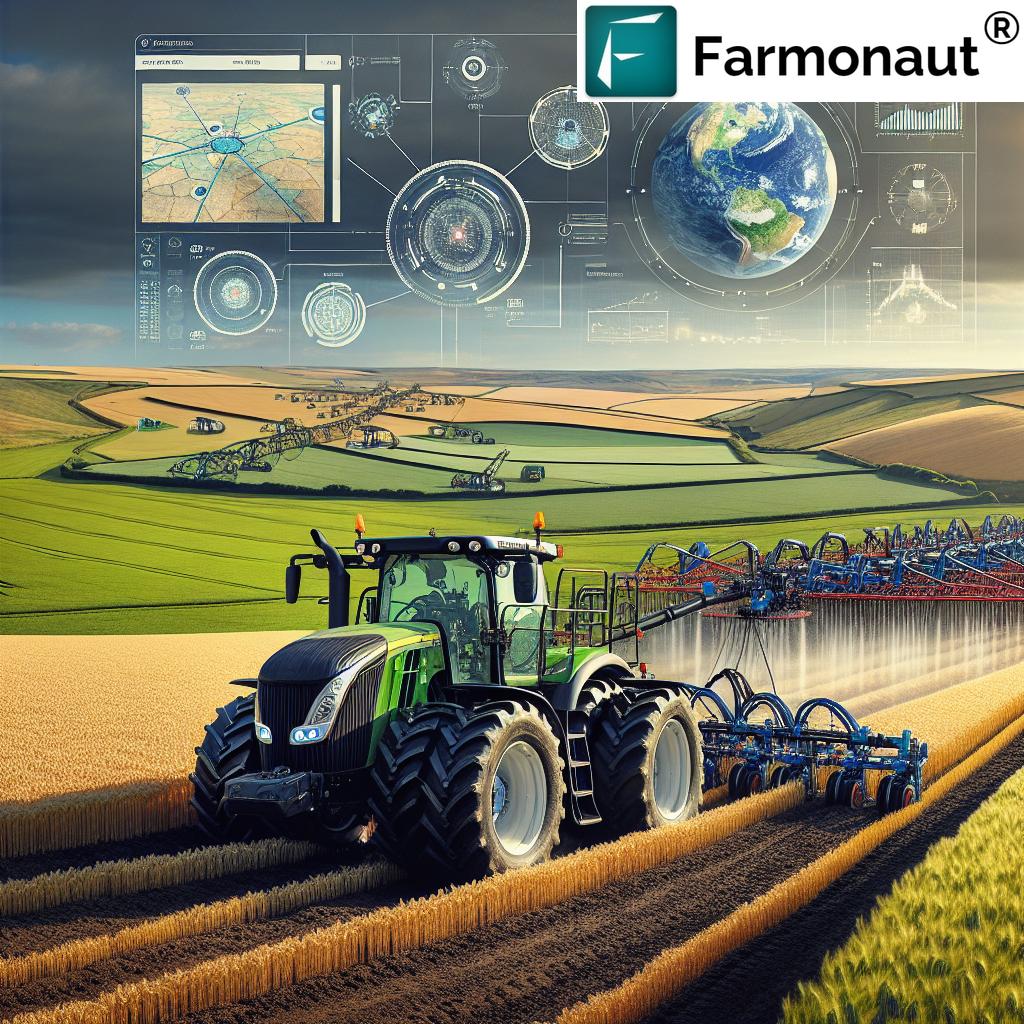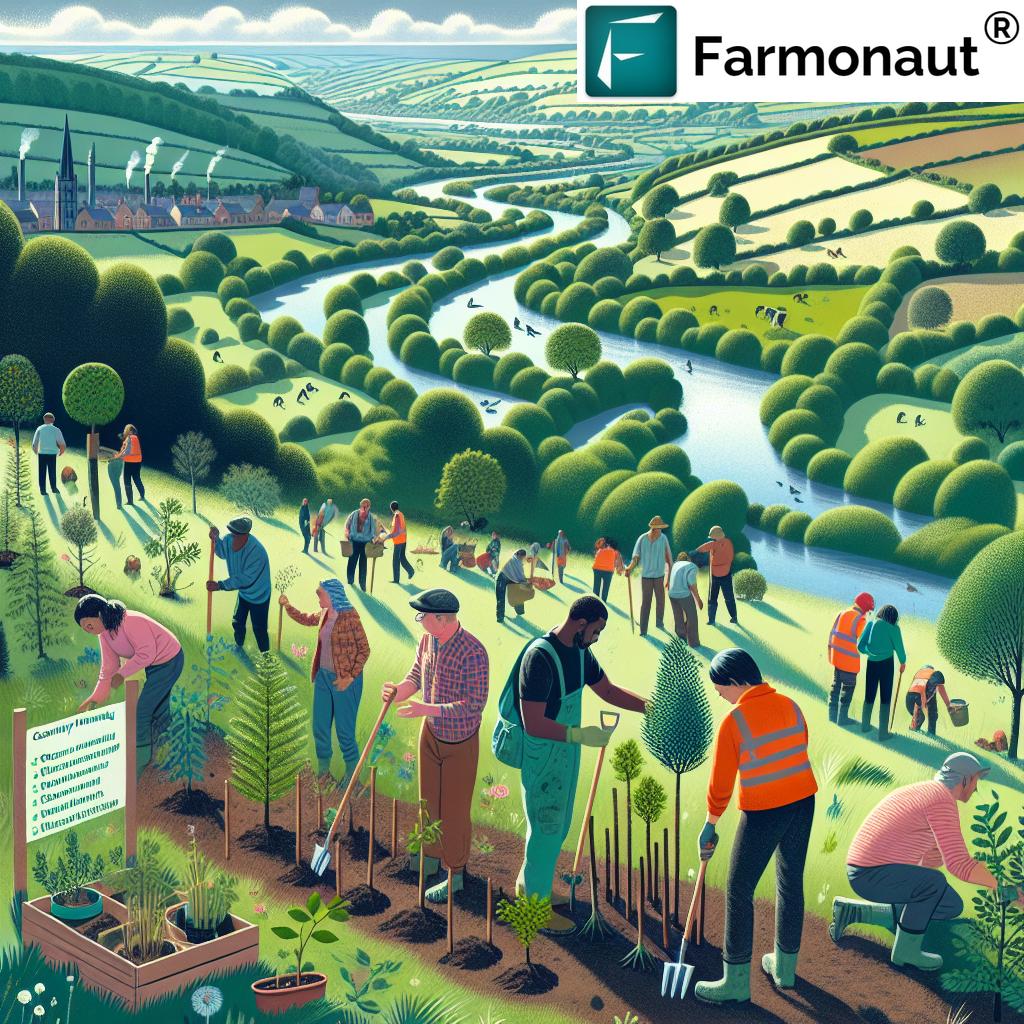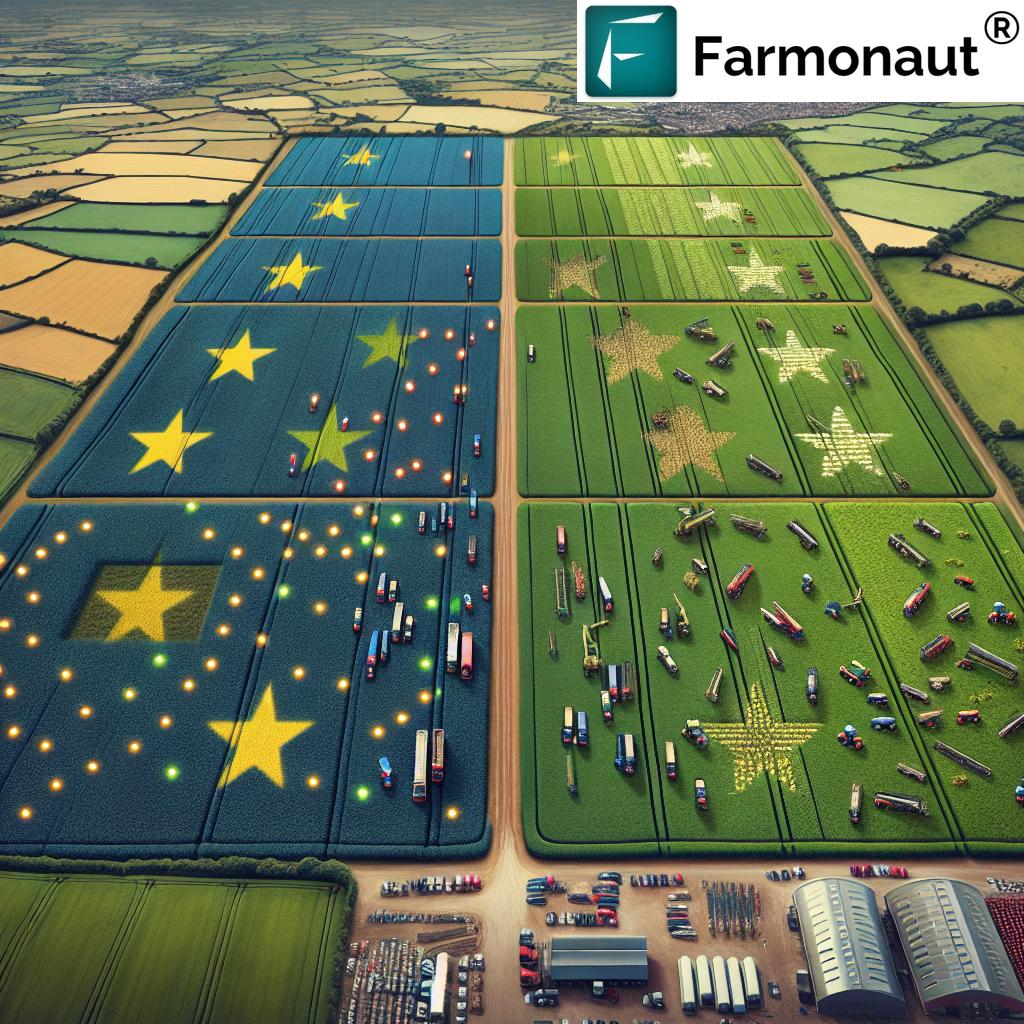Revolutionizing Scottish Farming: Farmonaut’s New App for Reducing Greenhouse Gas Emissions and Boosting Soil Carbon Storage
“Farmonaut’s new app integrates with on-farm sensors to measure and reduce greenhouse gas emissions in Scottish agriculture.”
In the ever-evolving landscape of modern agriculture, we are witnessing a transformative shift towards sustainable farming practices. At the forefront of this revolution is a groundbreaking farm emissions reduction app that is set to change the face of Scottish farming. This innovative mobile application, designed specifically for arable and mixed farmers, harnesses the power of digital tools to estimate and reduce greenhouse gas (GHG) emissions in agriculture while simultaneously boosting soil carbon storage.
As we delve into the intricacies of this climate-smart agriculture initiative, we’ll explore how this cutting-edge technology is empowering farmers with the tools they need to implement effective practices that reduce farm GHG emissions and maximize soil carbon sequestration. Join us as we uncover the collaborative efforts between researchers and farmers in refining this arable farming technology, ensuring its real-world applicability and shaping the future of farming in Scotland and beyond.
The Need for Sustainable Farming Practices in Scotland
Scotland’s agricultural sector plays a vital role in the country’s economy and food security. However, like many regions worldwide, it faces significant challenges in balancing productivity with environmental sustainability. The Scottish government has set ambitious targets for reducing greenhouse gas emissions, and the agricultural sector is a key focus area for achieving these goals.
- Agriculture accounts for a significant portion of Scotland’s GHG emissions
- Climate change poses risks to crop yields and livestock health
- There’s increasing pressure to adopt sustainable farming practices
- Soil health and carbon sequestration are becoming critical concerns
In response to these challenges, innovative solutions like Farmonaut’s new app are emerging to help farmers transition towards more sustainable and efficient farming methods.
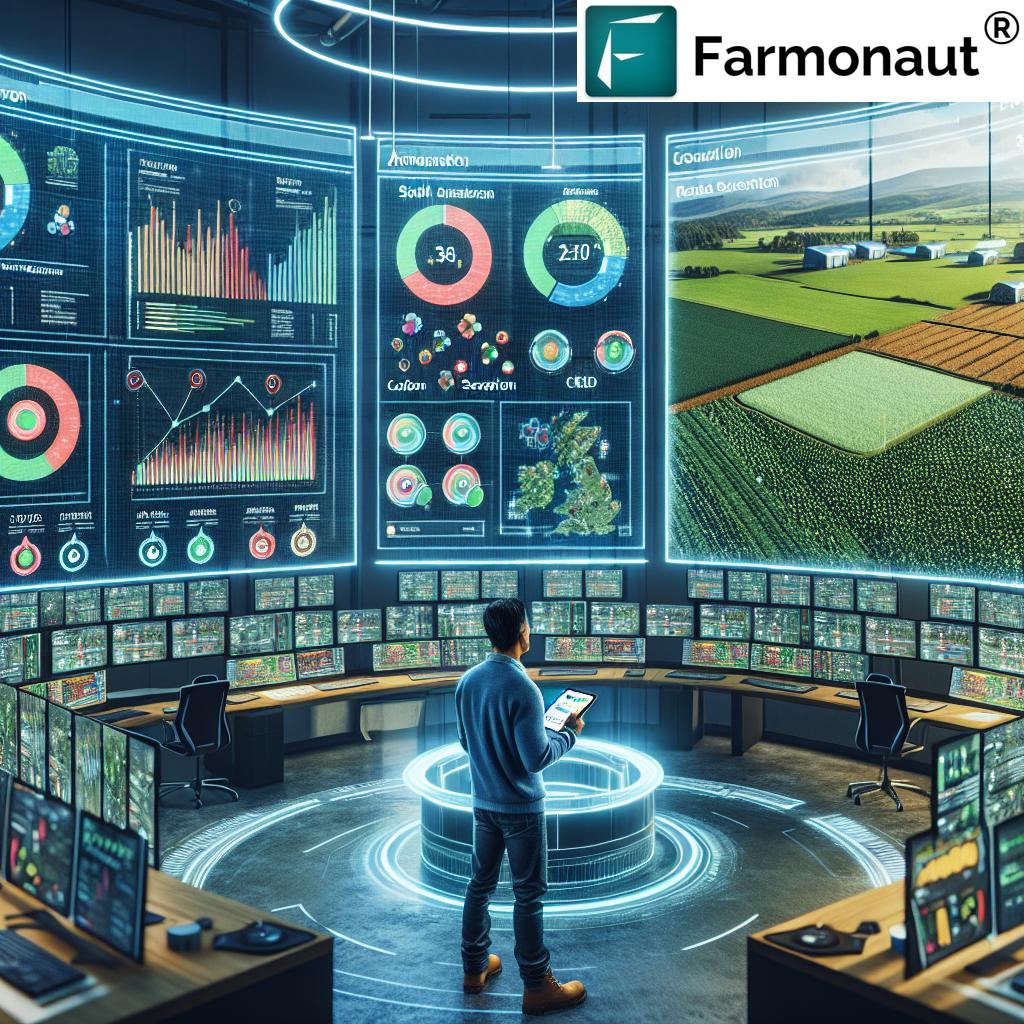
Introducing Farmonaut’s Revolutionary Farm Emissions Reduction App
Farmonaut, a pioneering agricultural technology company, has developed a state-of-the-art mobile application that addresses the pressing need for sustainable farming practices in Scotland. This innovative app is designed to help arable and mixed farmers estimate, track, and reduce their greenhouse gas emissions while enhancing soil carbon storage.
Key Features of the App:
- Real-time GHG emissions tracking
- Integration with on-farm sensors for accurate data collection
- AI-powered recommendations for emissions reduction strategies
- Soil carbon storage estimation and enhancement tools
- User-friendly interface for easy adoption by farmers
By leveraging advanced technologies such as satellite imagery, artificial intelligence, and machine learning, Farmonaut’s app provides farmers with a comprehensive toolkit for implementing climate-smart agriculture practices.
Access Farmonaut’s innovative solutions:
How the App Works: A Deep Dive into Agricultural Emissions Management
The farm emissions reduction app developed by Farmonaut is a sophisticated piece of agricultural technology that combines various data sources and analytical tools to provide farmers with actionable insights. Here’s a closer look at how the app functions:
- Data Collection: The app integrates with on-farm sensors to gather real-time data on various farm activities and environmental conditions. This includes information on soil moisture, temperature, fertilizer application, and livestock management.
- Emissions Calculation: Using advanced algorithms, the app processes the collected data to estimate greenhouse gas emissions from different farm operations. This includes emissions from soil, livestock, machinery, and other sources.
- Carbon Storage Assessment: The app utilizes satellite imagery and machine learning models to assess soil carbon levels and potential for carbon sequestration across the farm.
- Tailored Recommendations: Based on the emissions data and carbon storage potential, the app generates personalized recommendations for reducing GHG emissions and enhancing soil carbon storage.
- Progress Tracking: Farmers can monitor their progress over time, visualizing the impact of their efforts in reducing emissions and improving soil health.
This comprehensive approach to agricultural emissions management empowers farmers to make informed decisions that benefit both their operations and the environment.
The Impact of Digital Tools on Sustainable Farming Practices
The introduction of digital tools like Farmonaut’s app is revolutionizing the way farmers approach sustainable agriculture. These technologies are providing unprecedented insights and capabilities that were previously unavailable or difficult to access for many farmers.
“The innovative mobile application helps arable and mixed farmers estimate and manage GHG output while boosting soil carbon storage.”
Some of the key impacts of digital tools on sustainable farming practices include:
- Precision Agriculture: Digital tools enable farmers to apply inputs like water, fertilizers, and pesticides with greater precision, reducing waste and environmental impact.
- Data-Driven Decision Making: With access to real-time data and analytics, farmers can make more informed decisions about crop management, livestock care, and resource allocation.
- Improved Resource Efficiency: By optimizing resource use, digital tools help farmers reduce their environmental footprint while potentially improving yields and profitability.
- Enhanced Monitoring and Reporting: Digital tools facilitate easier tracking and reporting of environmental metrics, which can be crucial for compliance with regulations and participation in carbon markets.
- Facilitation of Best Practices: Apps can provide farmers with up-to-date information on best practices for sustainable farming, tailored to their specific conditions and needs.
The adoption of these digital tools is not just beneficial for individual farmers but also contributes to the broader goals of reducing agricultural greenhouse gas emissions and promoting climate-smart agriculture on a national and global scale.

Strategies for Reducing Farm GHG Emissions
Farmonaut’s app provides farmers with a range of strategies to reduce their greenhouse gas emissions. These strategies are based on scientific research and best practices in sustainable agriculture. Some key approaches include:
- Optimized Fertilizer Use: The app helps farmers apply fertilizers more efficiently, reducing nitrous oxide emissions.
- Improved Livestock Management: Suggestions for diet modifications and manure management to reduce methane emissions from livestock.
- Energy-Efficient Machinery: Recommendations for using and maintaining farm equipment to minimize fuel consumption and emissions.
- Crop Rotation and Cover Crops: Guidance on implementing crop rotations and using cover crops to enhance soil health and carbon sequestration.
- Precision Agriculture Techniques: Utilization of GPS and sensor technologies for more precise application of inputs, reducing waste and emissions.
By implementing these strategies, farmers can significantly reduce their GHG emissions while often improving productivity and soil health.
Boosting Soil Carbon Storage: A Win-Win for Farmers and the Environment
One of the most exciting aspects of Farmonaut’s app is its focus on enhancing soil carbon storage. This not only helps mitigate climate change but also improves soil health and farm productivity. The app provides farmers with tools and strategies to increase carbon sequestration in their soils, including:
- No-Till or Reduced Tillage Practices: Guidance on minimizing soil disturbance to preserve soil structure and organic matter.
- Cover Crop Management: Recommendations for selecting and managing cover crops to maximize carbon input into the soil.
- Organic Matter Addition: Advice on incorporating organic materials like compost or manure to boost soil carbon levels.
- Agroforestry Practices: Suggestions for integrating trees and shrubs into farming systems to increase carbon storage both above and below ground.
- Grazing Management: For mixed farms, strategies to optimize grazing patterns to promote grass growth and soil carbon accumulation.
By focusing on these practices, farmers can create a virtuous cycle of improved soil health, increased productivity, and enhanced carbon sequestration.
Collaboration Between Researchers and Farmers
The development and refinement of Farmonaut’s app is a testament to the power of collaboration between researchers and farmers. This partnership ensures that the technology remains grounded in real-world applicability while benefiting from the latest scientific insights.
Key aspects of this collaboration include:
- Field Testing: Farmers provide valuable feedback on the app’s usability and effectiveness in real farm settings.
- Data Sharing: Anonymized data collected through the app contributes to broader research on agricultural emissions and sustainable practices.
- Continuous Improvement: Regular updates to the app based on new research findings and farmer feedback.
- Knowledge Exchange: Workshops and training sessions where researchers and experienced farmers share insights with the wider farming community.
- Policy Influence: Collective insights from the app usage inform policy discussions on sustainable agriculture at the national level.
This collaborative approach ensures that the app remains a cutting-edge tool that truly meets the needs of Scottish farmers while advancing the broader goals of sustainable agriculture.
The Future of Farming: Climate-Smart Agriculture and Beyond
As we look to the future, it’s clear that tools like Farmonaut’s emissions reduction app will play an increasingly crucial role in shaping sustainable farming practices. The app is not just a standalone solution but part of a broader movement towards climate-smart agriculture.
Some key trends and developments we can expect to see include:
- Integration with Other Technologies: Further integration with IoT devices, drones, and advanced sensors for even more precise farm management.
- Artificial Intelligence and Machine Learning: Enhanced predictive capabilities to help farmers anticipate and mitigate environmental challenges.
- Carbon Market Participation: Tools to help farmers quantify and potentially monetize their carbon sequestration efforts through carbon credit markets.
- Biodiversity Enhancement: Expanded features to help farmers promote biodiversity alongside emissions reduction and carbon storage.
- Consumer Engagement: Potential for apps to provide traceability information to consumers, showcasing the sustainable practices used in food production.
These developments promise to make sustainable farming not just an environmental imperative but also an economically attractive option for farmers.
Comparing Traditional and App-Assisted Farming Methods
To better understand the impact of Farmonaut’s app on farming practices, let’s compare traditional methods with app-assisted approaches:
| Farming Practice | Traditional Method | App-Assisted Method |
|---|---|---|
| Soil Carbon Measurement | Infrequent lab testing, limited data | Regular satellite-based estimates, comprehensive data |
| Fertilizer Application | Based on general guidelines, potential over-application | Precision application based on real-time soil data |
| Crop Rotation Planning | Based on traditional knowledge, limited optimization | AI-assisted planning for optimal soil health and emissions reduction |
| Emissions Tracking | Manual calculations, time-consuming | Automated, real-time tracking with higher accuracy |
| Carbon Sequestration Estimates | Limited understanding, rarely quantified | Regular estimates based on satellite data and farm practices |
This comparison highlights the significant advantages that app-assisted farming methods offer in terms of precision, efficiency, and environmental impact.
Overcoming Challenges in Adopting New Agricultural Technologies
While the benefits of Farmonaut’s app are clear, we recognize that adopting new technologies can present challenges for farmers. Some common hurdles include:
- Technology Literacy: Some farmers may feel intimidated by new digital tools.
- Initial Investment: There may be costs associated with acquiring necessary hardware or upgrading existing systems.
- Data Privacy Concerns: Farmers may have concerns about how their farm data is used and protected.
- Resistance to Change: Long-standing farming practices can be difficult to alter.
- Reliability of Technology: Concerns about the dependability of new systems in crucial farming operations.
To address these challenges, Farmonaut and its partners are committed to:
- Providing comprehensive training and support for farmers adopting the app
- Ensuring transparent data policies and robust security measures
- Demonstrating the long-term economic benefits of adopting sustainable practices
- Continuously improving the app’s reliability and user-friendliness based on farmer feedback
By addressing these concerns head-on, we aim to facilitate widespread adoption of this transformative technology across Scottish farms.
The Role of Government and Policy in Supporting Sustainable Farming
The success of initiatives like Farmonaut’s emissions reduction app is greatly enhanced by supportive government policies and programs. The Scottish government has shown commitment to promoting sustainable agriculture, and this app aligns well with several policy objectives.
Key areas of government support include:
- Research Funding: Continued investment in agricultural research and technology development.
- Incentive Programs: Financial incentives for farmers adopting sustainable practices and technologies.
- Education and Training: Support for programs that help farmers learn about and implement new sustainable farming methods.
- Regulatory Framework: Development of regulations that encourage sustainable practices while providing flexibility for innovation.
- Carbon Markets: Exploration of carbon credit systems that could provide additional income for farmers sequestering carbon.
These policy measures create an enabling environment for the adoption of climate-smart agriculture technologies like Farmonaut’s app, accelerating the transition to more sustainable farming practices across Scotland.
Conclusion: A Greener Future for Scottish Agriculture
As we’ve explored throughout this article, Farmonaut’s innovative farm emissions reduction app represents a significant step forward in the quest for sustainable agriculture in Scotland. By providing farmers with powerful digital tools to measure, manage, and reduce their greenhouse gas emissions while enhancing soil carbon storage, this technology is paving the way for a greener, more resilient agricultural sector.
The benefits of this app extend beyond individual farms, contributing to national efforts to combat climate change and preserve Scotland’s rich natural heritage. As more farmers adopt these climate-smart practices, we can look forward to:
- Reduced overall agricultural emissions
- Improved soil health and productivity
- Enhanced biodiversity on farmlands
- Greater resilience to climate change impacts
- A more sustainable and competitive Scottish agricultural sector
The journey towards fully sustainable farming practices is ongoing, but with tools like Farmonaut’s app and the collaborative efforts of farmers, researchers, and policymakers, Scotland is well-positioned to lead the way in climate-smart agriculture. As we continue to innovate and adapt, the future of farming looks brighter and greener than ever before.
Frequently Asked Questions (FAQ)
Q1: How does Farmonaut’s app measure greenhouse gas emissions?
A1: The app integrates data from on-farm sensors, satellite imagery, and user inputs to estimate emissions from various farm activities. It uses advanced algorithms to process this data and provide accurate GHG emission estimates.
Q2: Can the app be used on all types of farms?
A2: While the app is primarily designed for arable and mixed farms, it can be adapted for various farming systems. However, its effectiveness may vary depending on the specific farm type and practices.
Q3: Is farmers’ data kept confidential?
A3: Yes, Farmonaut places a high priority on data privacy and security. All farm-specific data is kept confidential and is only used in aggregated, anonymized forms for research purposes with explicit farmer consent.
Q4: How often should farmers use the app for best results?
A4: For optimal results, it’s recommended to use the app regularly, ideally daily or weekly, to track changes and implement recommendations in real-time.
Q5: Are there any costs associated with using the app?
A5: While basic features may be available for free, premium features might require a subscription. It’s best to check Farmonaut’s official website or contact their sales team for current pricing information.
For developers interested in integrating Farmonaut’s powerful satellite and weather data into their own applications, check out our API and API Developer Docs.
As we conclude this exploration of Farmonaut’s groundbreaking app for reducing greenhouse gas emissions and boosting soil carbon storage in Scottish farming, we’re reminded of the immense potential that lies at the intersection of technology and agriculture. By embracing these innovative digital tools, Scottish farmers are not just adapting to the challenges of climate change – they’re actively contributing to the solution, paving the way for a more sustainable and prosperous agricultural future.





